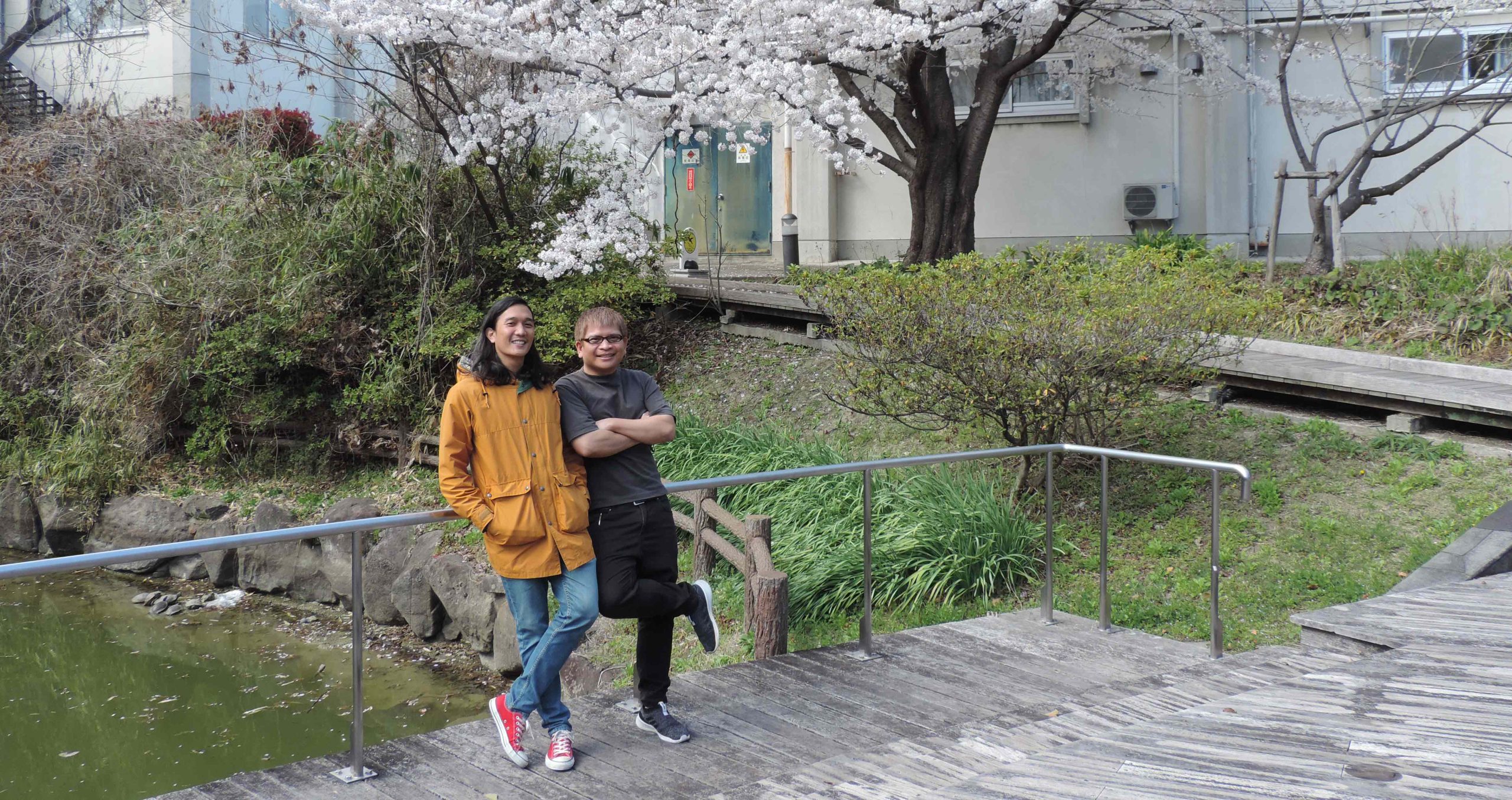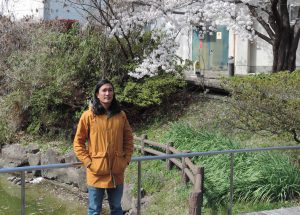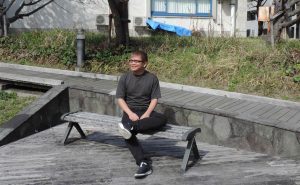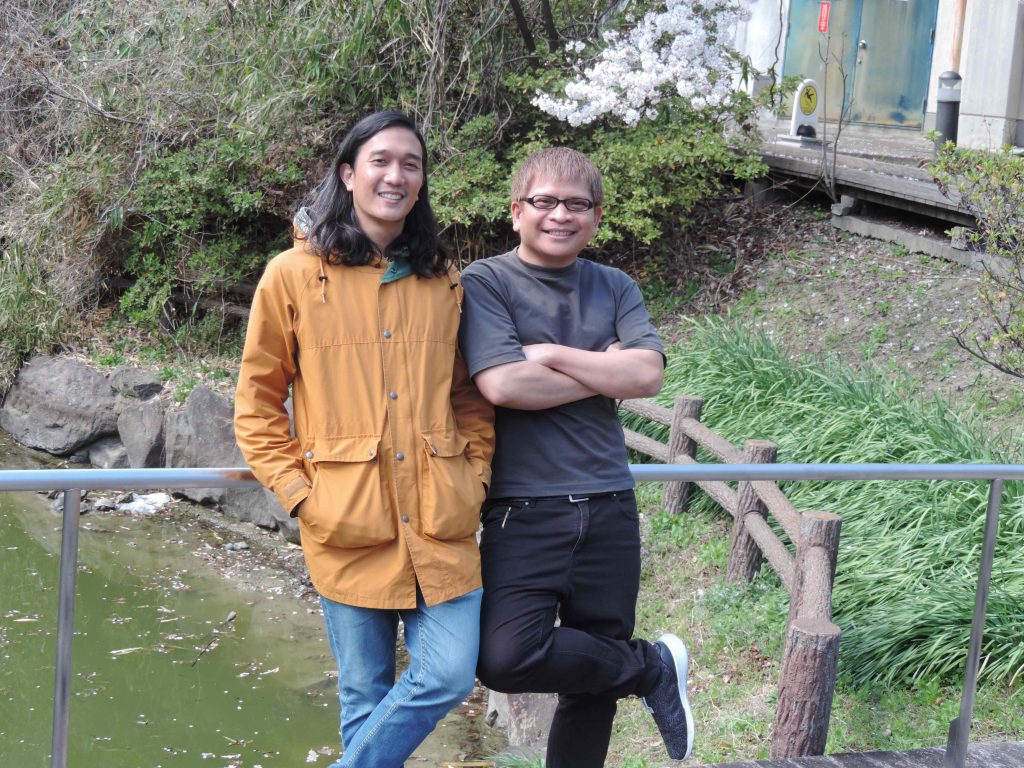OSIPP留学生対談 vol.2 博士後期課程(博士課程)
2022.5.20

(日本語は後述)
I interviewed Gideon Ponio from the Philippines and Moris Deri from Malaysia in the form of a conversation. They are both in their first year of a doctoral course. Moris is in Professor Toshiya Hoshino’s laboratory, and Gideon is in Professor Nobuo Akai’s laboratory.
Can you please describe your career/academic and/or professional experience before coming to OSIPP?
(Gideon) I graduated with a bachelor’s degree in Business Management in Philippines, worked for 3 years in the private sector before going to the US for masters. Then graduated from masters with a degree in Urban Planning and worked for local government in the US. After that I returned to the Philippines and worked for the national government for 3 years. Concurrently, I taught in my original university for one semester. I began my doctoral research in Belgium where I also obtained another master’s degree in Maritime Transportation Management. From Belgium I moved here to Japan and entered OSIPP to continue my PhD research.
(Moris) I graduated with a bachelor’s degree and then worked as an analyst for a foreign bank in Malaysia before joining OSIPP. I have also some experience in startups, nonprofits, and political organizations.
In your countries, do most people go to grad-school after some working experience?

Gideon Ponioさん
(Gideon) Actually, in my generation, pursuing a master’s degree is not very common. However, now, I think the master’s degree is turning to what bachelor’s degree used to be for work.
(Moris) That is similar in Malaysia. A master’s degree is nothing special. The government has encouraged us to get a PhD. Currently, we already have a surplus of PhD holders who have no jobs or their jobs are not related to their PhD or their professional executive experience.
(Gideon) I have studied in universities in the US, Europe and Japan and I noticed that it is common to go straight from your bachelor’s degree to master’s. On the other hand, in Philippines, usually they work first after graduating with a bachelor’s degree. After working for a while they feel the need for graduate studies, for obtaining another degree might help in their career objectives
(Moris) In Malaysia, most people except whose goal is to become academics usually work first because they have to pay back student loans and gain experience. Currently, it is becoming very common for people, who did not plan to go to the higher education, to get tired or board of working then go back to University to study.
Can you tell me what brought you to Japan and why you choose OSIPP?
(Gideon) My former colleagues in the Philippine Ministry of Transportation, as well as members of JICA that I have worked with, advised me to apply for the MEXT scholarship if ever I decided to study again. Growing up with anime, video games, and having enjoyed a vacation in Japan previously, also made me consider living in Japan. The reason I chose OSIPP among other Japanese Universities is because of its academic expertise in International public policy.
(Moris) My best friend in the US university is a Japanese and he recommended me to come to Japan so I was thinking of studying in Japan. And later, I got the MEXT scholarship and finally got the opportunity to come to Japan. I looked for a university which has a proper environment for majoring in public policy, in English in Kansai-region where the friend lived and I found OSIPP.
Can you please describe your academic life; the courses you are taking, the main theme of your thesis, etc.

Moris Deriさん
(Gideon) My research involves the technical efficiency of ports, particularly Asian ports, and its relationship with economic regulation and corruption. I have taken one economic class and one political class in OSIPP so far. I am also learning Japanese through no-credit electives.
(Moris) I have taken multidisciplinary courses from international politics to development economics. My thesis is on financial crime and victimology.
Do you think that you need to use Japanese in your OSIPP life?
(Gideon) There are a lot of international students in OSIPP and we can speak to professors in English so Japanese is not something that we have to speak. But when communicating with Japanese students, or in everyday life, if you can speak Japanese, that helps you a lot.
(Moris) In academic life, we don’t need to. Some courses are held in English so they don’t require us to know Japanese. But there’re some courses which is only held in Japanese so you have more option if you can understand Japanese.
Since you two have experience of studying in university other than Japan, I would like to ask you the features of OSIPP or Japanese universities.
(Gideon) Osaka University is located in a big city, such as Osaka and is quite close to the CBD. You can go pub-crawling or shopping easily so it is convenient and fun.
(Moris) It depends on the professor, but generally in Japan, I feel like professors do not actively tell us “you have to do this” all the time. If we ask them for advice or any questions they will answer us in detail but otherwise they rarely give us something like assignment.
(Gideon) I think it is not strictly with the style of educating but rather the way of communicating in general. Relating with other people in my country as well as the US is more friendly and open. Here in Japan, it seems more reserved. It makes international students feel, especially during the pandemic, a bit solitary at first though.
For the last question, I’d like to ask you for your plan after finishing your PhD.
(Gideon) I would like to either be a University Professor, work for a multinational policy firm like the OECD or the World Bank. I don’t really care about which country to work at so I’ll go wherever if there’s an opportunity.
(Moris) Since I am D-1 now so I haven’t decided yet but I am thinking of working with an NPO or returning to the bank.
This is the end of our interview! Thank you so much for today!
******************************************************************************
今回は、フィリピン出身のGideon Ponio(ギデオン ポニオ)さんとマレーシア出身のMoris Deri(モリス デリ)さんに対談形式でインタビューを行いました。お二人はともに、博士後期課程1年で、Morisさんは星野俊也教授の研究室に、Gideonさんは赤井伸郎教授の研究室に所属しています。
OSIPP留学までのキャリアについて、教えてください。

Gideon Ponioさん
(Gideon) 私はフィリピンの大学で経営学部を卒業後、民間企業で3年間働き、その後米国の大学院で都市計画の修士号を取得しました。米国の地方自治体で2年、フィリピンで3年間働いたほか、出身大学で1学期間教鞭をとりました。その後、ベルギーに1年間留学して海運管理の修士号を取得し、来日してOSIPPの研究生となった後、博士後期課程に入学しました。
(Moris) 私はマレーシアで学部を卒業し、アナリストとして外資系金融機関に勤め、その金融機関を退職後、OSIPPの博士前期課程に入学しました。
お二人の母国では、大学院に進学する前に一旦社会人として働く人が多いのでしょうか?
(Gideon) そもそも、私の世代(10年前)では大学院への進学があまり多くなかったですが、現在は修士号がかつての学士のような位置づけになりつつあるようです。
(Moris) それは、マレーシアでも同様で、今や修士号は珍しくありません。政府も博士号取得者を増やすべく政策をとってきましたが、近年は博士号取得者ですら供給過多で、職に就けなかったり、研究とは全く関係のない職に就いたりしている人も多くいます。
(Gideon) 進学に関しては、私は米国やベルギー、日本の大学に所属してきましたが、それらの国では大学院にストレートに進学する人が多いように思います。一方、フィリピンでは学部卒業後に一旦働く人が多いです。働く中でもっと上のポジションに就きたいと思い、そのためには修士号や博士号を取得したほうがいいと考えて大学に戻るケースが多いです。
(Moris) マレーシアでは、研究者を目指している人達以外は、学士までの奨学金の返済や、社会人経験を積むために、一度働く場合が多いです。近年では、元々進学するつもりのなかった人たちが働くことに疲れたり飽きたりして、大学での勉強に戻るケースが増加しています。
留学先として日本や、OSIPPを選んだ理由は何ですか。
(Gideon) 私は、フィリピンの運輸省での同僚でJICAから来ていた人に日本の文部科学省の奨学金を薦められたことがきっかけです。日本のアニメやゲームに触れて育ったため日本に興味があり、いつか住んでみたいとは思っていました。OSIPP を選んだのは、国際公共政策を専門とするアカデミックな環境が整っているからです。
(Moris) 私は、米国留学で出会った日本人の友人に来日を薦められていたことがきっかけで留学を検討していたところ、文部科学省の奨学金を受給できることになり、日本に来る機会を得ました。大学院選択に関しては、友人が関西在住だったことと、公共政策を専門に英語で学べる環境を条件に探した結果、OSIPPが当てはまりました。
研究内容や履修している授業など、アカデミックライフについて教えてください。
(Gideon) 研究テーマは東南アジアの港の技術的効率性、及び経済制限との関係で、政治学系の授業と経済学系の授業を一つずつ履修しました。また、
(Moris) 私の研究テーマは金融犯罪における被害者学で、国際政治から開発経済学まで、様々な分野の授業を履修しています。
OSIPPの生活において日本語は必要ですか?

Moris Deriさん
(Gideon) 留学生が多く、私も先生方とは英語でやり取りしますが、日本人学生との交流や日常生活では、やはり日本語が話せるに越したことはないと思います。
(Moris) 英語で開講されている授業も多く、必ずしも必要ではないです。ただ日本語開講の授業もあるので、日本語をある程度習得していた方が履修できる授業の幅は広がります。
日本以外の大学で学んだ経験のあるお二人から見た、OSIPPや大阪大学の特徴は何でしょうか?
(Gideon) 大阪大学は都会の中心部のすぐ近くにあるのは特徴の一つで、買い物やバーめぐりなどもしやすく、便利で楽しいです。
(Moris)個人差はあると思いますが、海外の大学に比べて先生からの発信で「これをしなさい」という指導は少ないかもしれません。私から質問や意見を求めれば丁寧に教えてくれますが、課題などを先生から課されることは少ないです。
(Gideon) おそらく、それは文化の違いによるコミュニケーションの取り方の違いに起因しているのだと思います。教授の指導スタイルに限らず、友達の作り方や人との関わり方も、 母国やアメリカの方がもっとフレンドリーかつオープンで、日本人の方は少し慎重で控えめに感じます。ですから、留学生にとって特にコロナ禍では少し寂しく感じることもあると思います。
最後に、大学院修了後のプランについて教えてください。
(Gideon) 大学教員になるか、OECDや世界銀行などの国際機関で働きたいと考えています。どこの国で働くかについてはこだわりがなく、チャンスがあればどこででも働きたいです。
(Moris) まだ、博士後期課程1年なので、具体的に決まっていませんが、NPOに就職するか、以前に働いていた銀行に再度勤務する可能性もあると思っています。
本日はお忙しい中、ありがとうございました。
(OSIPP博士前期課程 中瀬悠)

